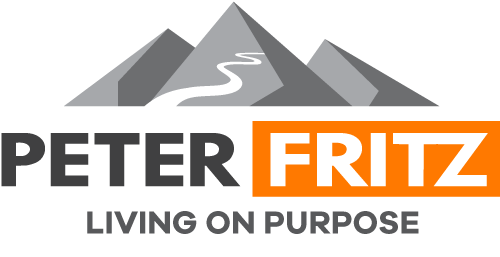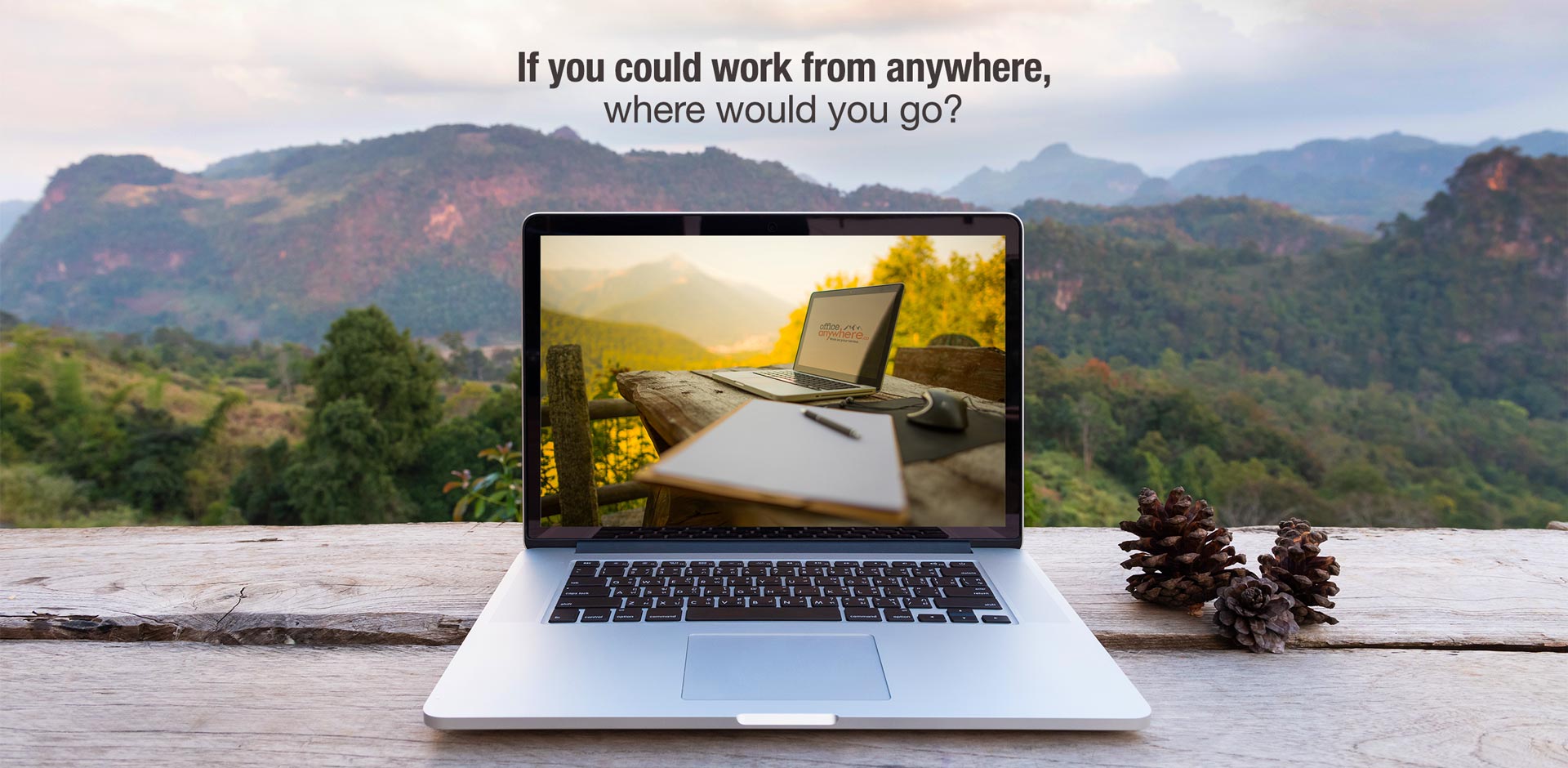
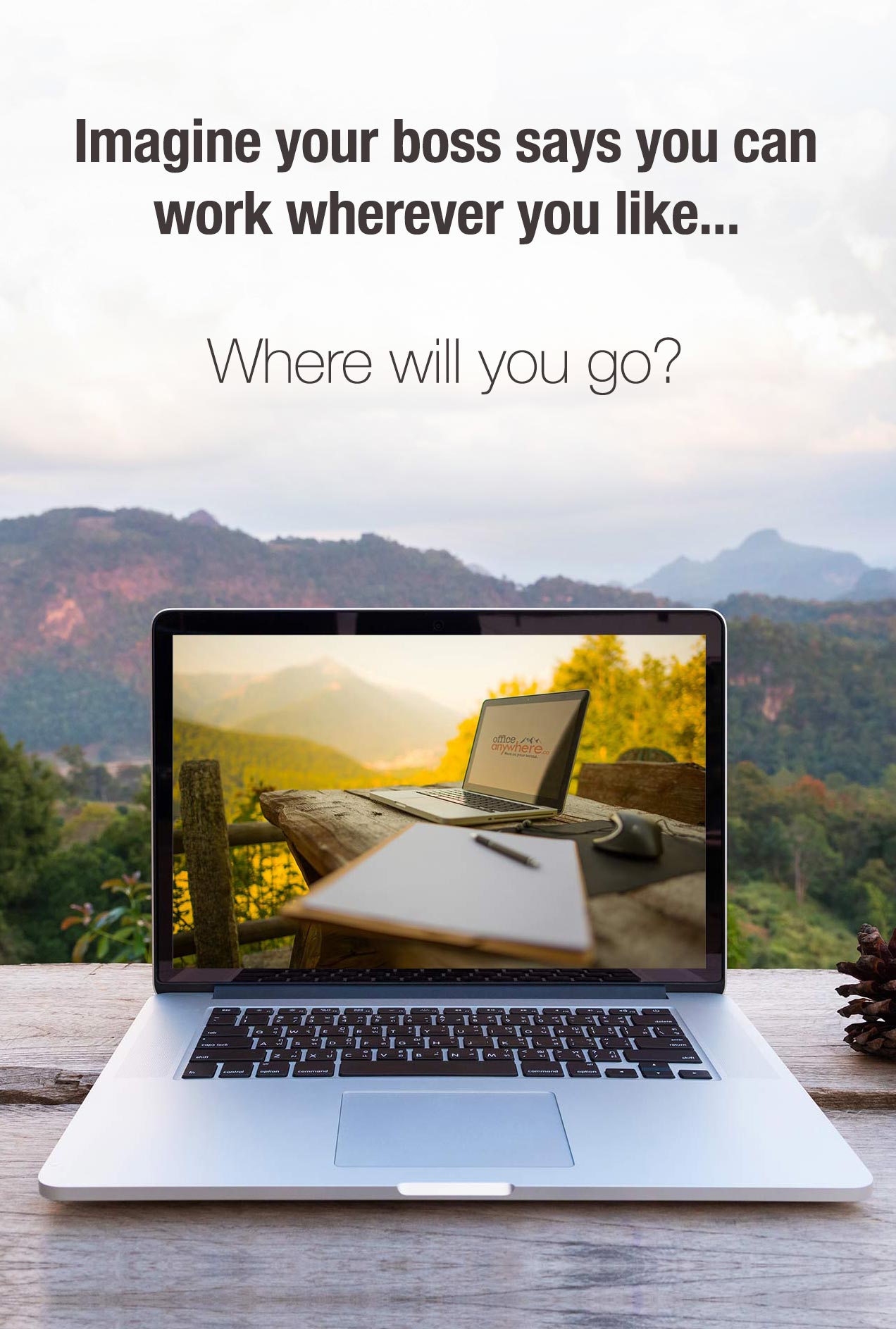

How to convince your boss to let you work remotely, and keep it that way after COVID-19 is over.
Get (and keep) the independence, freedom and control you crave.
COVID-19 has pushed remote work to the forefront of public discourse, causing an unprecedented impact on business and life. Like thousands of others, you may be working from home for the first time. And although adjusting to this new way of life might feel awkward, I believe after tasting the freedom and autonomy of remote work, many of you will resist the call to return to your office.
******
My name is Peter Fritz, and I’ve worked remotely for over 20 years. I know I look a bit serious in the video above, but working from home can, and likely will, change your life (regardless of the current global pandemic).
The scene I describe below the pic of my kids is what I experienced when I began working from home.
I hadn’t quit my job, and I hadn’t started a business. All I’d done was take the first and most important step towards working and living on my terms. I’d convinced my boss to let me do my job from home.
Immediately, it was a life-changer, and in the years since, it’s allowed me the time and flexibility to see my kids more – to attend daytime school performances, to take care of them when they’re sick, and to just ‘be around’ more.
It’s also allowed me to work where, when and how I choose – whether that’s in my beautiful home office, a lakeside park bench, or in my car as I tear up a mountain pass in the Victorian High Country.
It’s made me a happier, calmer and more effective person.
Work/life balance is a tough nut to crack, but once you choose how to work, it becomes a whole lot easier.
Escape the Office helps you build a compelling case to present to your boss. In fact, it’s so compelling, she’ll likely be thrilled to say yes!
Impatient? Skip ahead.
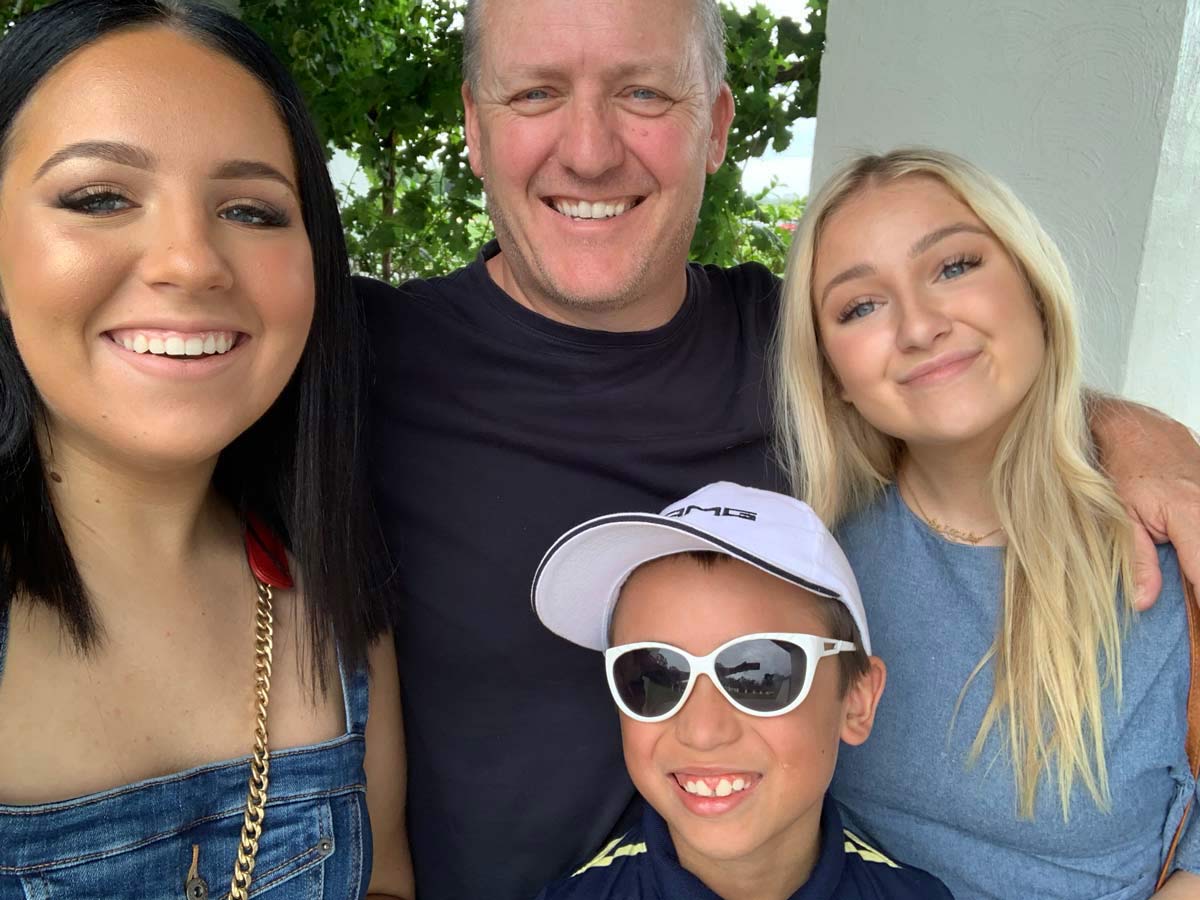
Me and my precious kids, Sarah, Tommy & Amy.
The #1 reason you’re not working remotely? You’re afraid the boss will say, “NO.”
Control the narrative, and get a “YES!” instead.
Imagine it’s a Monday morning one month from now, and you’re sitting at your front window, watching everyone in your neighbourhood go to work.
Doors slam in random succession as flustered, half-awake people rush from their homes, throwing bags and jackets into waiting cars. In the city, the sound of hurried footsteps on concrete blend with the hiss of air brakes as glazed-eyed cargo funnels off the pavement and into waiting buses.
From your cosy vantage point, you witness the madness; the daily routine that plays out every Monday through Friday, just as it has for the last sixty years.
Last week, you were part of it.
With the last of the neighbours gone, you stroll back to your kitchen and prepare breakfast. Over eggs, toast and coffee, you grab a book from your ‘one day’ pile, and for the first time in years, enjoy a leisurely, uninterrupted, stress-free meal.
Glancing back at your front window, you smile, “So this is what freedom feels like.”

It might just save your life.
If you’ve ever gone bankrupt or split up with someone, I think you’ll relate to this.
Back in 2006, I found myself on the precipice of financial collapse. A few years earlier, I’d over-leveraged myself into a handful of real estate investments. It was a struggle, but with a lot of hard work, I believed I’d make it through. Most nights, you’d find me sanding architraves or painting a wall till 2:00 am. It was exhausting, back-breaking work, but I was determined to see it through.
Then my employer hit a cashflow crisis and overnight, my income halved. To top it off, the banks were getting nervous, lending dried up, and interest rates began to climb. In the end, the 16-hour days amounted to exactly nought, and by mid-2007, I’d lost everything, including my marriage.
The GFC went on to claim fortunes of all sizes across the developed world. In the US alone, nearly 10 million homeowners saw the foreclosure sale of their homes, as whole suburbs transformed into ghost towns.
On May 1, 2007, I moved into a tiny two-bedroom townhouse in a neighbouring suburb. I wanted to die. Not metaphorically – literally. Had it not been for my work-at-home arrangement, plus the help of two special people, I would have moved out of that townhouse and into a bottle, a la Nick Cage in ‘Leaving Las Vegas’.
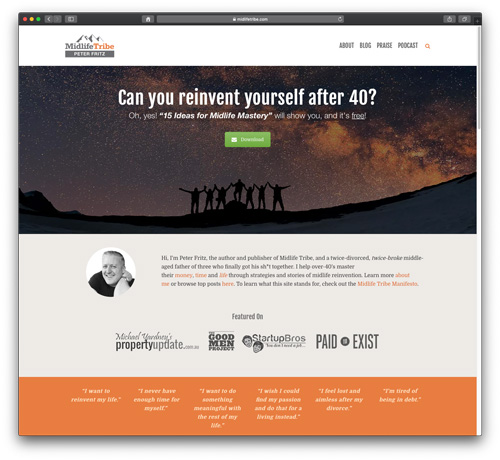 A few years later, the rumblings of a midlife crisis began, and by the time I hit 45, I became thoroughly disenchanted with life. I felt like everything I’d done, everything I’d striven for had meant nothing. I lacked purpose and direction, and it became abundantly clear that chasing status and money hadn’t made me happy. I needed something else. I needed to create something bigger than me.
A few years later, the rumblings of a midlife crisis began, and by the time I hit 45, I became thoroughly disenchanted with life. I felt like everything I’d done, everything I’d striven for had meant nothing. I lacked purpose and direction, and it became abundantly clear that chasing status and money hadn’t made me happy. I needed something else. I needed to create something bigger than me.
A series of lightbulbs went off in late 2016, and soon after, my first blog was born – midlifetribe.com. I also wrote a small book about getting out of debt – one of the key achievements of my midlife reinvention. By late 2017, I was excited to get out of bed again.
Being able to work when, where, and how I chose made much of it possible. It helped me get through that tumultuous period, and it allowed me to structure my days around my energy levels. It gave me the means to pursue something exciting on the side.
Had I been stuck on the hamster wheel of home-to-office-to-home every day, I don’t think I’d have had the creative or physical energy to do any of it.
Working from home saved my life.
The most valuable thing you’ll ever have.
I’m one of those people who’ll pay extra for groceries if it means saving half an hour. I’ll pay a man to cut my grass or wash my car if it helps me complete a work project sooner, or hang out with my son a bit more.
We all know that time is our most limited and valuable resource, yet many of us squander it like we have an unlimited supply. But every hour passed is one we’ll never get back.
It’s the opposite with money. You can lose every dollar and make it all back again. Some of the most successful business owners, investors and entrepreneurs have done precisely that.
When my marriage collapsed, I went from five real estate properties and a handful of grown-up toys to no properties, no toys, and $140,000 in debt. I even lost my lawnmower.
A decade later, my new wife and I have two houses, four cars (fully-owned), a handful of nice things, and savings in the bank. But best of all, we both work from home, and we control our own schedules.
That means we start each day with a leisurely cup of tea on the sofa. My wife and son like English Breakfast, while I’m more Assam Bold. We’ve abandoned the default panic-state that’s so common today. Instead, we live deliberately; not tossed around like leaves in the wind.
One of the most valuable and important things in my life occurs every weekday at 8:30 am when I walk our son to school. Those ten minutes are priceless. We talk, we laugh, and we strengthen the bond between us. Right now, I get a peace sign and ‘I love you, dad’ from him every time. Tell me that isn’t Everything.
Often, I’ll extend my walk around the neighbourhood before returning home to start my ‘normal’ work – the stuff I do for my employer. It’s a wonderfully unhurried way to begin each day, and it sets the dial to ‘calm and productive’ for the rest of the day.
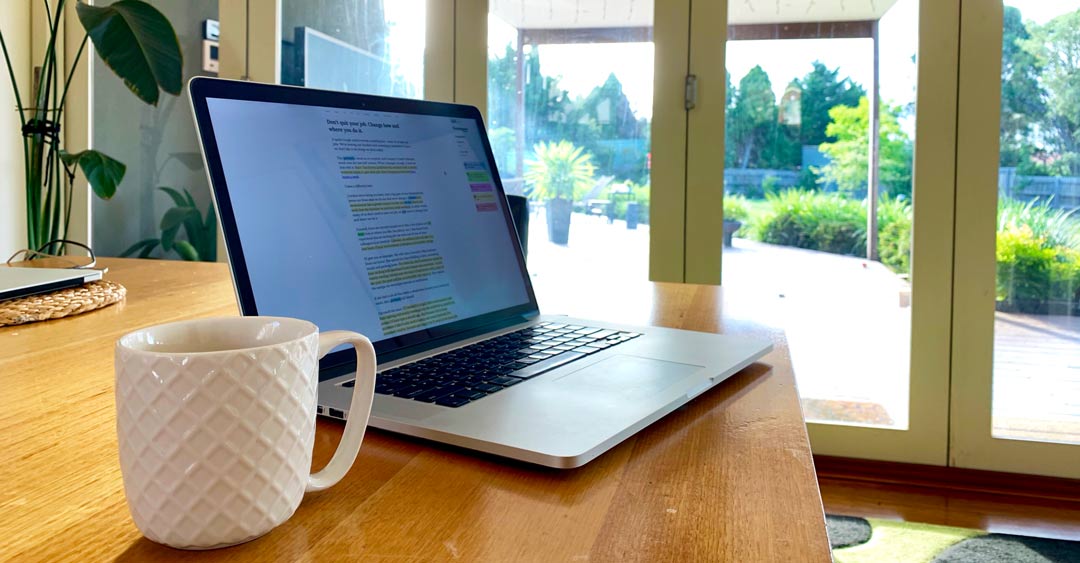
Actually, my day begins much earlier – usually at around 5:30 am. That’s when I sit, as I am right now, at our dining table to work on my passion project. For two years, that was Midlife Tribe. Today, it’s Office Anywhere, and specifically, this life-changing course.
Because I don’t have to dress up and commute to an office, I can invest a couple of hours around dawn into something I care about. Right now, it’s this project. Other times, it’s reading or learning something new. Whether you’re a morning person or not, there’s something powerful about doing stuff before the sun (and the rest of the house) rises. Magic happens in that golden hour, and it compounds over time.
Time is the most valuable thing you’ll ever have. When you’re in charge of how you spend it, wonderful things begin to happen.
Don’t die before they bury you.

Okay, so we’re onto death analogies now. The inescapable fact is, your life will end faster than you think. Once you get past 40, it accelerates with a velocity that’ll shock you.
However, there is one way to slow it down.
When you control how, where and when you work, you gain agency over vast tracts of your life – the hours before, during and after work. That means you can add variety, which, aside from being the spice of life, slows the passage of time. When you do the same thing day in day out, life flashes by, but throw in a couple of new things here and there, and you become aware of time again. You notice things more; nuances that were hidden, fresh perspectives and new ideas. You become alive again.
Since writing about midlife reinvention, and then specifically about working on my terms, I’ve been fortunate to receive emails from people all over the world. What’s struck me most is not the uniqueness of the stories, but the similarities. Yes, there are certain issues unique to age groups and countries – around goals and government policies, for example – but there are common threads in your emails and social media comments.
Almost universally, we crave agency over our lives; we want to do things that matter, and we’re drowning in a cesspool of busy-ness and consumerism.
The chasm between what we want to do versus what we believe we must do creates tension in the back of the throat and the pit of the stomach. It causes our relationships to suffer, our health to falter, and our dreams to wither and die.
Quotable Quotes
“I want to start a business on the side, but my job takes up all of my time, and I’m exhausted at the end of each day. I need the weekends just to recover.”
“My kids are growing up glued to their screens because I’m hardly around, and when I am, I’m too tired to do things with them. I feel like I’m failing as a parent.”
“Despite all the hours I spend in the office, I can never get any real work done because of all the distractions, interruptions and meetings. I’m always trying to catch-up at nights and on weekends.”
“The office environment saps all of my creative energy.”
“I waste hours every week commuting. It’s getting worse, too, and rushing to work stresses me out.”
“I’d love to take up a hobby, but I never seem to have the time.”
“I’m tired of sucking up to my boss. I want to be measured on my work, not how early I show up or stay back at the office.”
“I’m never relaxed at home because my job constantly occupies my thoughts. Juggling my personal and family needs with my work is becoming impossible.”
“My relationship with my partner isn’t like it used to be because we hardly see each other anymore, and when we do, we’re not our best selves.”
“I see my colleagues and clients more than my own family. I’m married to my job and it’s slowly ruining everything. I have no quality of life anymore. Something has to change.”
“But I already tried something, and it didn’t work.”
I suspect you’ve seen enough platitudes about perseverance and success, so I won’t bore you with more of them. Yes, what you believe and how you think are important, but sometimes, a plan of attack is more valuable. Then once you see some results, the thinking part becomes a lot easier.
So here’s a refresher on how successful endeavours usually play out:
- Decide what you want or don’t want.
- Decide that it’s worth doing something about it.
- Find someone who’s done the thing you want to do and pay them to teach you. The paying part is vital because if you don’t pay (even if it’s just a book purchase), you’re unlikely to act on the advice.
- Do what they tell you – especially if it’s a bit uncomfortable at first.
- As soon as you see some results, your belief in the decision gets a boost.
- Your elevated belief fuels the rest of your journey, which in turn delivers more of the results you sought.
So perhaps you’ve tried a few things, but they didn’t work out. Maybe you:
- Asked your boss for flexible hours but she knocked you back.
- Explored ‘work-from-home’ opportunities that were actually scams or over-hyped hobbies.
- Started work early so you could finish early, but you just worked longer hours.
- Caught up on work over the weekends or after the kids went to bed.
- Considered part-time work, but the pay and instability were deal-breakers.
- Started a side-hustle, but it never went anywhere because you were too tired to give it the energy and focus it required.
- Left work early to do ‘sales calls’, but snuck home to deal with personal matters – then felt guilty about it for days after.
- Put your kids in after-school care but then struggled to pay the fees.
- Dreamed of starting your own business but felt overwhelmed with the risks and complexity of it all.
- Started your own business but failed, so you had to find a job again.
- Have a bunch of ideas for a side project that could go somewhere, but you’re stuck between a rock and a hard place thanks to your current workload. You just don’t have enough time.
- Have almost resigned yourself to the idea that it’s the same for everyone, and you should learn to live with it.
Ugh, I feel depressed just reading these, and I’m the one who wrote them! But that’s why Escape the Office is so powerful. It takes you from “I’m stuck…” to “I’m finally in control of my life – woo-hoo!”
The bottom line is, the one thing preventing you from escaping the office to work on your terms is a carefully-structured game plan.
INTRODUCING

Escape the Office Game Plan
Leave your job without quitting your job.
The biggest obstacle to the FREEDOM and CONTROL you crave is your boss.
Escape the Office is an easy, self-paced course that tilts the odds in your favour. It gives you a clear plan that’ll soon have you working where you want, and your boss thanking you for showing them how.
The fact is, most of us work in a way that doesn’t align with who we are or how we should work. We’re boxed into old constructs that no longer serve us – they’re remnants of the industrial age, where everyone gathers under one roof each day like glorified factory workers.
Working from home (and the half-dozen other places I work) is the best work/life decision I ever made. It’s improved every aspect of my life – giving me the freedom to live and work in a way that supports my life, not one that dictates my life. I want you to have that kind of freedom, too.
Once your boss green-lights your request to work remotely, you’ll be able to:
- spend more time with your family
- pursue a side hustle
- write that book or start a blog
- save money
- indulge in a hobby
- reduce stress and anxiety
- produce better work at your job
- improve your physical and mental health
- learn new skills (in your current industry or a different one)
- help your parents
- invest in your community
What’s more, the effects will compound over time, opening up all kinds of opportunities for you in the future, because each benefit enhances the next, making you happier, less stressed, more productive and a lot more optimistic about life.
Here’s what you’ll learn.
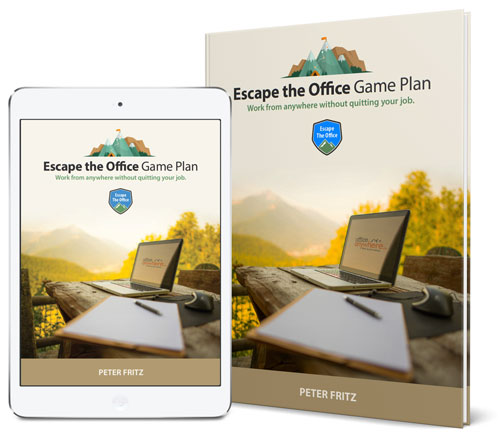
Escape the Office includes a well-researched 38-page guide that walks you step-by-step through your own personal escape plan. If you’re keen, you could finish the whole thing in a few hours over a weekend. I recommend spreading it out over a week, so you can really think about your answers.
Eight videos augment the guide – one for each section, plus an introduction and a wrap-up. Critically, Escape the Office also includes a draft escape letter, with spaces to add the elements relevant to your unique situation.
Through the guide and the videos, I walk you through the six crucial checkpoints listed below. Together, they put you in the best possible position to pitch your employer and get a resounding “YES!”
1 | The Lay of the Land
- Here, you’ll learn how the modern workforce is changing; what it means for you and your employer, and why the news is good for both of you.
- We dissect and overcome the fears many of us feel. This isn’t feel-good fluff, but practical material that’ll make you confident to move forward.
2 | The 5 Elements of an Effective Escape Plan
At this checkpoint, I introduce the five essential elements of a stellar escape plan:
- Get clear on the objectives and outcomes – for you and your employer.
- Give evidence to support your case, including technologies you can leverage.
- Provide assurances around being accountable, reachable and productive.
- Document how you’ll work – the environment, metrics, tools and practices.
- The trial request, where everything is distilled into a compelling escape letter.
3 | Build your Case with Data
- Rather than have you Googling till the early hours, I’ve done the hard work for you. This section contains compelling stats from respected sources to back your mission.
- Unless your boss sees the benefits, you’re unlikely to succeed. Here, you’ll learn about the huge benefits available to employers who adopt remote work policies.
- As an added assurance, you’ll also get some insight into remote work trends and where it’s all heading.
4 | The Q & A – Your Personal Escape Plan
- This is where it all starts to come together in a guided, fill-in-the-blanks section for drafting your personal escape plan. Using what you’ve learned in the previous three stages, I ask key questions about your situation and how it relates to the data you’ve collected and the outcomes you seek.
- Your responses to the questions in this section ensure nothing gets missed, and they inform the content within your own escape letter.
5 | The Escape Letter
- Finally, we use your personal escape plan from stage 4 to create your escape letter.
- A well-researched and properly structured escape letter shows your boss you respect their time, you value your job, and you have everyone’s interests at heart. It delivers a genuine win-win.
- As an added reassurance, I will check your letter for structure, style, pacing and grammar before you hand it to your employer.
6 | If They Say No – Overcoming Objections
- Objections can arise, and so in this section, I walk you through a dozen of the most likely ones and offer rebuttals you can try. You might use some of them to deal with potential objections in your escape letter before they arise.
- In the end, most objections are a veil for ignorance or fear of the unknown. Your job is to illustrate as succinctly as you can (and in a language your boss appreciates) the many benefits they stand to gain from allowing this to happen. A brief trial usually puts their concerns to rest.
It’s not for everyone, but it might be perfect for you.
Millions of professionals around the world work remotely – from home offices, cafes, coworker spaces and lakeside cabins. Some even crisscross the globe in RVs, stopping occasionally to do some work with a view of something like the Grand Canyon.
Others prefer to stay in one spot – like my friend Laura, who runs a substantial operation from her designer couch in swanky New York City.
Over the past 20 years, I’ve worked from dozens of different locations, and I swear to everything that’s holy I’ll never go back to a ‘normal’ office; not even for triple the money.
Remote work delivers so many benefits – none of which exist in a cubicle. It’s also the least risky way to segue into your own business because of the time it gives you (no more commuting) and the flexibility it offers around working hours.
For some of you, though, it remains a dream. That’s because you’re scared to ask your boss about it. This course help you banish fear with a clever plan of attack.

Escape the Office is for you if you’re a professional in a role where the location has little impact on job performance, and you want to start directing your life instead of having it dictated to you. Here are some industries where remote work arrangements are common and growing:
- Computer and mathematical
- Sales and marketing
- Arts, design, entertainment, sports and media
- Farming, fishing and forestry
- Life, physical, and social sciences
- Legal and accounting
- Military services
- Community and social services
- Architecture and engineering
- Business and financial services
Now, I recognise many jobs can’t be done remotely. You can’t drive a train from home, nor can you teach tenth-grade maths from your garage. You can’t serve customers in a restaurant if you’re never there.
But if your job has the potential for remote work (like the industries I’ve listed), or you’d like to switch to a job that could – Escape the Office will show you how to prepare your escape plan in advance.
Once you’ve finished the course, you may never return to it again. But completing the course will dramatically increase your chance of success, which for you means working from anywhere you want!
“But, but, but…”
Over the last thirty years, I’ve bought enough courses to choke a donkey. Most times, I’ve had doubts before committing – even when I knew they’d be good for me. Some cost me fifty bucks, some a few grand. Thankfully, most were worth every penny; some much more.
When considering a course, I’d read the testimonials from others and wonder if they were real, or if their circumstances were like mine. The answers were usually yes to the first and no to the second. ‘Yes’ to the first because I only bought courses from people I knew and respected. I trusted them. ‘No’ to the second because we’re all living with unique circumstances, perspectives, influences and needs. The variables, therefore, are infinite.
So, I’m not going to tell you anything that assumes I know you better than you know yourself. But I will give you a couple of assurances that might help you decide to join me.
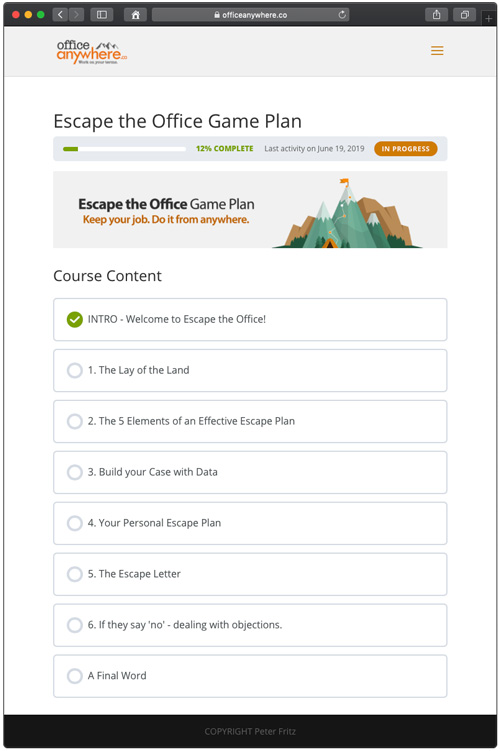 “I don’t know if this will work for me.”
“I don’t know if this will work for me.”
No, you don’t, and neither do I. I can’t say, “Do the work and you’ll succeed,” because we both know nothing’s certain. Maybe your boss is immovable. Maybe you need a different job. All I can say is, this course will put you in the best position to succeed.
“I’m worried I won’t see it through.”
Join the club – the line goes around the corner.
But here’s what I think. Once you start filling in your course guide, you’ll want to finish it. You’ll realise that it isn’t just doable, it’ll probably change your life.
Also, if you’ve read this far, then perhaps you’re predisposed to finishing things. Just start, and then don’t quit until you’re done. Like I said earlier, you could knock this course over in a day if you were keen, so if you’re worried about finishing, just power through it and get it over with. Then bask in the magnificence of your new life.
“I can’t afford it.”
Compared to what? Those heels you’ve been eyeing? Dinner and a movie? A set of tyres for the car? Am I being too harsh?
Saying we can’t afford something is like saying we don’t have time. That can be true (I really can’t afford an island in the Mediterranean), but often what we mean is, “It’s not important enough to spend time or money on it.”
If you really can’t afford this course (assuming you want what it promises), you might have to go without something for a week or two. If it’s still a problem, perhaps you can ask a friend or family member to help you out. Just make sure you finish the course and pay them back.
“What if the course doesn’t help me?”
I’ve spent years thinking about this course and many months creating it. I wanted to make sure it surpassed your lofty expectations. That’s why I’ve even offered to vet your escape letter before you hand it to your boss.
However, I know things don’t always meet expectations, and if that’s the case with you and this course, I don’t want you to resent it (or me for that matter). Just write to me within 60 days of purchase and tell me what went wrong. Show me you actually gave it a decent go, and I’ll give you your money back. At least then we can part as friends.
“I’m still unsure. What if I have questions?”
I want you to be comfortable investing in this course, so if you still have questions, just email me and I’ll be happy to help. If it’s not right for you, I’ll tell you. If you’re sitting on the fence because of the usual reasons that stop us from doing what’s good for us, I’ll tell you that, too.
For some of you, Escape the Office will be exactly what you need, and working remotely will change your life in ways you never imagined. It might even save your life, just like it did for me.
But like most things, you won’t know for sure until you give it a go, and with a 60-day money-back guarantee, it’s hard to call it risky.
I say embrace it. Take the course, complete the guide and draft your escape letter. What awaits you on the other side is a life with more time, less stress, more harmonious relationships, and the flexibility to explore new paths.
You weren’t born to spend your life inside a cubicle staring at TPS reports or yawning through another bunch of PowerPoints. You were born to do things you’re proud of; to explore a little, to be curious, to live.
My wish is to see you inside Escape the Office, and to see you living and working on your terms. You have nothing to lose if you try, and everything to gain if you succeed. Do it.
Start planning your escape this weekend!

